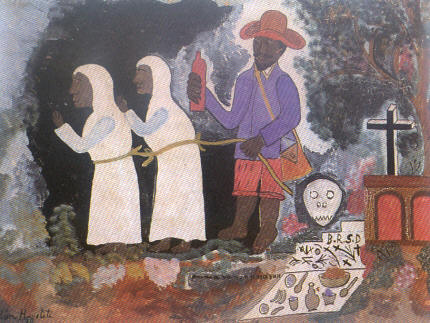The religion of Voodoo (also known as Vodou, Vodun, Voudun, Vo, Vaudois, Vodu, Voudoux) is the successor of traditional African beliefs. It is presumed that voodoo started on the territory of Benin from 6,000 to 10,000 years ago. Half the population in the coast of the Gulf of Guinea (Benin, Togo, Ghana) and in Central Africa (Congo) are to this day adhere to voodoo.
The form of Voodoo that is known to us was formed in the Caribbeans, especially in Haiti. Calling it an ancient religion is a bit difficult, even when comparing to Islam or Shinto.
In the period of the French colonial slavery, Voodoo has had to appear as a mix of religious traditions from very different cultures, both Christian and pagan. The first slaves were brought to Haiti in 1503. Their owners prohibited them to practice their own religion, making them practice Catholicism instead. Helpless against the exploiters, the slaves worshiped Catholic saints as a cover up, while truly faithful to their own religion. This led to an addition of Christian influences into their religion.
The principals of the slave religion from West Africa has been initially connected with Christianity. As a result, the influence and merger of these beliefs, as well as different directions in Haiti, has spurred a new type of religious movement, which is now officially considered a branch of Catholicism. The name of this branch, Vodun (spirit), has been taken from an African language.
The basis of the ancient African beliefs was preserved. Notice that the following list doesn’t contain any mention of black magic in Voodoo.
The principals of the Voodoo religion
- Belief in one God
- Worship of holy places, people and objects
- Belief in life after death
- Constant presence of the invisible world of deceased ancestors spirits
- Lack of clear boundaries between life and religion
- Worship requires strict discipline and respect
- The spirits of the dead are a mediator between God and man
- Once a violation has been forgiven, it must not be mentioned ever again
- The person is fully involved in worship, including his body and soul
- The whole community is involved in training the young
- Serious attitude to the moral education of the young generation
- Respect for human dignity
- Respect for the elderly
- Blood unions are rarely violated
- Special attention to marriage as a union between individuals and families
- Respect for authority
- Caring for the poor, the sick, the widows and the orphans

